continental army
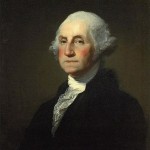
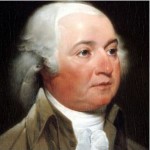 No country can truly be secure without an army, and the Thirteen Colonies (now the United States) was no different. After the beginning of the Revolutionary War, John Adams began to see the value of an army, so on June 10, 1775, he proposed to Congress, at a meeting in Philadelphia, that the men laying siege to Boston should be considered a Continental Army led by a general. The men who were mostly from New England, had armed themselves and rushed to surround British forces in Boston following the Battle of Lexington and Concord. Adams, who was representing Massachusetts, realized that the military effort would only succeed if the British thought the colonies were united. To achieve his united feel, Adams suggested than they appoint George Washington of Virginia, to command the Continental forces, despite the fact that New Englanders were used to fighting in local militias under officers elected from among their own ranks.
No country can truly be secure without an army, and the Thirteen Colonies (now the United States) was no different. After the beginning of the Revolutionary War, John Adams began to see the value of an army, so on June 10, 1775, he proposed to Congress, at a meeting in Philadelphia, that the men laying siege to Boston should be considered a Continental Army led by a general. The men who were mostly from New England, had armed themselves and rushed to surround British forces in Boston following the Battle of Lexington and Concord. Adams, who was representing Massachusetts, realized that the military effort would only succeed if the British thought the colonies were united. To achieve his united feel, Adams suggested than they appoint George Washington of Virginia, to command the Continental forces, despite the fact that New Englanders were used to fighting in local militias under officers elected from among their own ranks.
Five days later, on June 15th, Adams formally nominated George Washington as commander in chief of the Continental Army. Washington accepted the post on June 16th, and on June 17th, with no rest for the troops, the newly named army fought the Battle of Bunker Hill. John Adam’s wife, Abigail, and son, John Quincy Adams, watched the battle from their hometown of Braintree.
Just as the British had discovered the difficulties of waging war with rowdy and uncontrollable Yankees for soldiers during the Seven Years’ War, Washington was equally unimpressed when he met his supposed army. Just as the British had, he saw “stupidity” among the enlisted men, who were used to the easy familiarity of being commanded by neighbors. Upon arrival outside Boston, General George Washington organized this body of more than 22,000 men, known as the Main Army, into three divisions of two brigades each, promptly 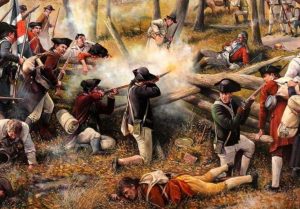
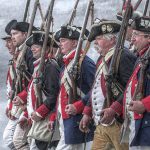 insisting that the officers behave with decorum and the enlisted men with respect. Washington had some success with this first Continental Army, but when the New Englanders went home to their farms at the end of 1775, General Washington had to start fresh with new recruits in 1776. In retrospect, I’m sure Washington had better control over the second Continental Army, because they didn’t know any other leadership style. George Washington remained the commander of the Continental Army until the end of the Revolutionary War.
insisting that the officers behave with decorum and the enlisted men with respect. Washington had some success with this first Continental Army, but when the New Englanders went home to their farms at the end of 1775, General Washington had to start fresh with new recruits in 1776. In retrospect, I’m sure Washington had better control over the second Continental Army, because they didn’t know any other leadership style. George Washington remained the commander of the Continental Army until the end of the Revolutionary War.
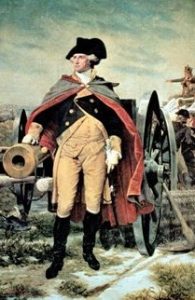
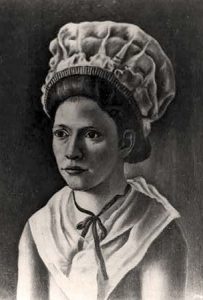 How many Generals can say that a housewife saved their life? Not many, I’m sure. Most housewives would never get near enough to a general in combat to do anything, but in the 1700s, things were different. Of course, it wasn’t like Philadelphia housewife and nurse Lydia Darragh, got out there and fought along-side General Washington and his Continental Army, but she was, nevertheless, able to single-handedly save their lives when she overheard the British planning a surprise attack on Washington’s army for the following day. Some say this is just a legend, and I guess we will never know for sure, but the story has endured for 240 years, which says something to me.
How many Generals can say that a housewife saved their life? Not many, I’m sure. Most housewives would never get near enough to a general in combat to do anything, but in the 1700s, things were different. Of course, it wasn’t like Philadelphia housewife and nurse Lydia Darragh, got out there and fought along-side General Washington and his Continental Army, but she was, nevertheless, able to single-handedly save their lives when she overheard the British planning a surprise attack on Washington’s army for the following day. Some say this is just a legend, and I guess we will never know for sure, but the story has endured for 240 years, which says something to me.
This historic event happened on December 2, 1777, during the occupation of Philadelphia. British General William Howe had stationed his headquarters across the street from the Darragh home. When Howe’s headquarters proved too small to hold meetings, he commandeered a large upstairs room in the Darraghs’ house. Although uncorroborated, family legend holds that Mrs. Darragh used to eavesdrop and take notes on the British meetings from an adjoining room and would conceal the notes by sewing them into her coat before passing them onto American troops stationed outside the city. It was a critical mistake on the part of the British, and the ingenious way of passing the information worked very well for the patriots.
On the evening of December 2, 1777, Darragh overheard the British commanders planning a surprise attack on Washington’s army at Whitemarsh, Pennsylvania, for December 4th and 5th. Somehow, it completely amazes me that they would be so careless with the information, especially considering the fact that they were in the home of the enemy. I guess they assumed that the housewife would have no idea what the “great military minds” were thinking or talking about, nor that she would have any way to pass the information to anyone who could do anything about it. I’m sure they were completely shocked when they realized that she had tipped General Washington off to the plot, and saved the lies of him and his army…as well as saving the day.
Using a cover story that she needed to buy flour from a nearby mill just outside the British line, Darragh passed the information to American Lieutenant Colonel Thomas Craig the following day. The British marched towards Whitemarsh on the evening of December 4, 1777, and were surprised to find General Washington and 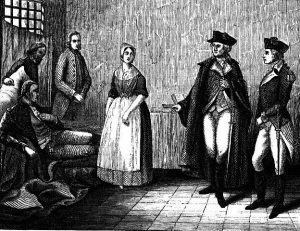
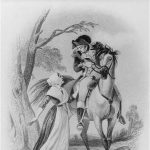 the Continental Army waiting for them. After three inconclusive days of skirmishing, General Howe chose to return his troops to Philadelphia. It’s an amazing victory for General Washington and his Continental Army, and it all happened because a patriot housewife turned spy for her country. When you think about it, she already had the perfect disguise for the job. It is said that members of the Central Intelligence Agency still tell the story of one of the first spies in American history.
the Continental Army waiting for them. After three inconclusive days of skirmishing, General Howe chose to return his troops to Philadelphia. It’s an amazing victory for General Washington and his Continental Army, and it all happened because a patriot housewife turned spy for her country. When you think about it, she already had the perfect disguise for the job. It is said that members of the Central Intelligence Agency still tell the story of one of the first spies in American history.
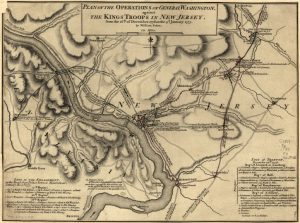 The year was 1776, and it was Christmas Day, but for the men with George Washington, it was not a day of celebration…not exactly anyway. They were in the middle of fighting a war, and the fighting didn’t just stop because it was Christmas, not this year anyway. This was to be an unusual Christmas as far as wartime Christmases went. In 1776, it was difficult to fight a war in the wintertime, because the slower modes of travel. Most times in a war, the armies took the Winter off from warring, but this army was not laying up for the Winter. This war would continue on…no matter what the weather was like.
The year was 1776, and it was Christmas Day, but for the men with George Washington, it was not a day of celebration…not exactly anyway. They were in the middle of fighting a war, and the fighting didn’t just stop because it was Christmas, not this year anyway. This was to be an unusual Christmas as far as wartime Christmases went. In 1776, it was difficult to fight a war in the wintertime, because the slower modes of travel. Most times in a war, the armies took the Winter off from warring, but this army was not laying up for the Winter. This war would continue on…no matter what the weather was like.
Things looked bad that year. The Continental Army had suffered a series of defeats in their battle against the British oppression. After some successful maneuvers, Colonel Henry Knox came to the attention of General George Washington who worked to place him in overall command to the Continental Army. Under his command, the Continentals brought 18 cannon over the river…3 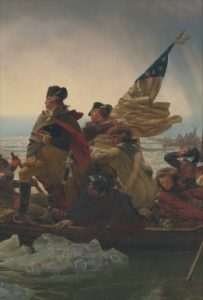 Pounders, 4 Pounders, some 6 Pounders, horses to pull the carriages, and enough ammunition for the coming battle. The 6 Pounders, weighing as much as 1,750 pounds were the most difficult to transport to the far side of the river. But in the end all the trouble of moving this large artillery train to Trenton proved its worth. Knox would place the bulk of his artillery at the top of the town where its fire commanded the center of Trenton.
Pounders, 4 Pounders, some 6 Pounders, horses to pull the carriages, and enough ammunition for the coming battle. The 6 Pounders, weighing as much as 1,750 pounds were the most difficult to transport to the far side of the river. But in the end all the trouble of moving this large artillery train to Trenton proved its worth. Knox would place the bulk of his artillery at the top of the town where its fire commanded the center of Trenton.
The plan devised by Knox and Washington was to conduct a surprise attack upon a Hessian garrison of roughly 1,400 soldiers located in and around Trenton, New Jersey. Washington hoped that a quick victory at Trenton would bolster sagging morale in his army and encourage more men to join the ranks of the Continentals in the coming new year. After several councils of war, General George Washington set the date for the river crossing for Christmas night 1776. It was an unprecedented plan, because the expectation was always that the armies would hold up somewhere for the winter. No one had attacked in winter before, and especially on Christmas. George Washington led 2,400 troops on a daring nighttime crossing of the icy Delaware River. Stealing into New Jersey, on December 26 the Continental forces launched the surprise attack on Trenton.
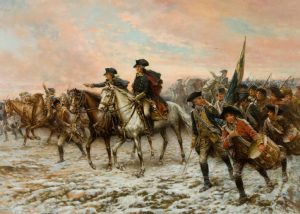 The gamble paid off. Many of the Hessians were still disoriented from the previous night’s holiday bender, and colonial forces defeated them with minimal bloodshed. While Washington had pulled off a shock victory, his army was unequipped to hold the city and he was forced to re-cross the Delaware that same day…with nearly 1,000 Hessian prisoners in tow. Washington would go on to score successive victories at the Battles of the Assunpink Creek and Princeton, and his audacious crossing of the frozen Delaware served as a crucial rallying cry for the beleaguered Continental Army. The Revolutionary War would be won by the Continental Army of course, and the rules of warfare changed forever.
The gamble paid off. Many of the Hessians were still disoriented from the previous night’s holiday bender, and colonial forces defeated them with minimal bloodshed. While Washington had pulled off a shock victory, his army was unequipped to hold the city and he was forced to re-cross the Delaware that same day…with nearly 1,000 Hessian prisoners in tow. Washington would go on to score successive victories at the Battles of the Assunpink Creek and Princeton, and his audacious crossing of the frozen Delaware served as a crucial rallying cry for the beleaguered Continental Army. The Revolutionary War would be won by the Continental Army of course, and the rules of warfare changed forever.

